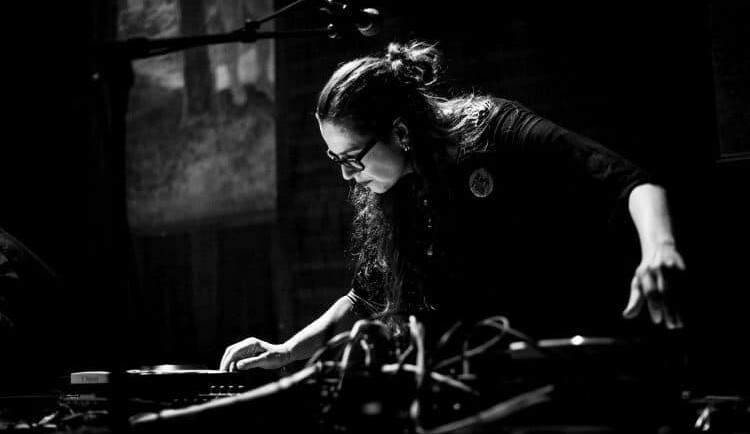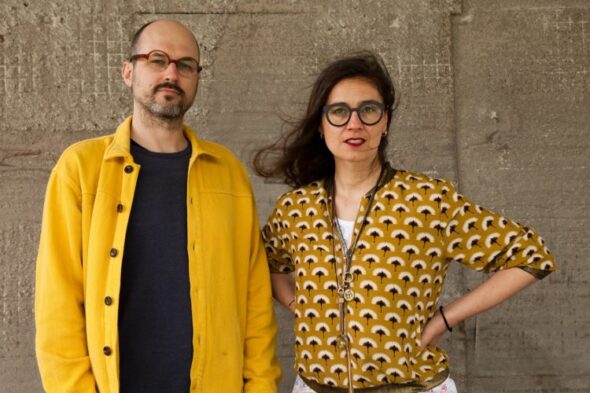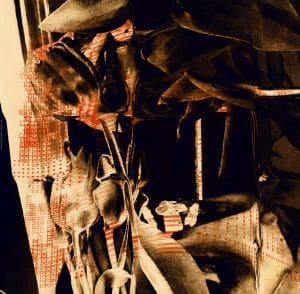
RDEČA RAKETA, the “red rocket”, is a duo project by MAJA OSOJNIK and MATIJA SCHELLANDER. They have been broadcasting their sounds for over ten years – for film, dance and theater. The project has come home. It’s one that you have to leave again and again in order to be able to come home to, according to OSOJNIK. With “… and cannot reach the silence” (VENTIL RECORDS), RDEČA RAKETA release another homecoming in the form of an album. The three pieces are preceded by three points. They symbolize the search; but for what? MAJA OSOJNIK explains more in a Zoom meeting with Christoph Benkeser.
Maja Osojnik: I am sorry that I’ve been so difficult to reach. But after all the Corona-Plan-Bs, the last few months have been pure madness. Everything has been piling up in terms of appointments. I’m now in a dance production and I’m working around the clock!
Which production is that? You wrote that you were in Kassel.
Maja Osojnik: Exactly, we’re rehearsing here in the Documenta Halle and then we’re moving to Duisburg. It’s a new piece, “A Divine Comedy” by Florentina Holzinger. The premiere is at the end of August at the Ruhrtriennale. I am responsible for the composition – together with Stefan Schneider.
Doesn’t sound like a vacation!
Maja Osojnik: Oh no, there will be no vacation this summer. After all the lockdowns, the desire for a vacation trip is of course huge. Above all, I am tempted by all the beautiful photos I get from friends on the way. I think to myself: It’s good that this project is so cool and the team is so great, otherwise it would be tough!
I can imagine that. At the same time, it’s nice that there’s so much going on again, isn’t it?
Maja Osojnik: When the first lockdown came, I noticed how incredibly overwhelmed the art scene was… or was that just me? You work on so many projects. At the same time, it was free time to finish pent-up work. Last summer developed surprisingly well. 2021 had already been planned – then came the Florentina project. So, the year has been picking up pace continuously since January. I am grateful that I am involved in such fine projects. Next year, I’m going to take an excessive vacation.
To calm down.
Maja Osojnik: Yes, I have already blocked time in my calendar for next summer. I want to go to Greece, to the Croatian islands, to the mountains – I want it all!
When someone like Florentina Holzinger approaches you with a production, you don’t say no, do you?
Maja Osojnik: Oh no, on the contrary, I really enjoy being there and I enjoy the process, the work, the development of the piece. The content is exciting, the team is great, lots of great artists on board. I learn new things every day.
That compensates for the exhaustion to some extent, I suppose.
Maja Osojnik: It’s weird because I’m slowly noticing it. But I’m passionate about this thing. So, the project gives me a lot of energy back.
Speaking of exhaustion. Rdeča Raketa, the red rocket, will soon take off with a new album.
Maja Osojnik: Finally! Actually, we should have presented our album at the Elevate Festival in Graz in May. The festival was postponed again. We then decided to put the concert into a video. Thanks to the cooperation between Elevate and Re-Imagine Europe, we were able to shoot a film in the Orpheum with the video artists Patrick K. H. and Ivan Marušić Klif. The presentation will take place at Elevate in August – while I’m in Germany. That’s the new reality, isn’t it?
As long as you don’t appear as a hologram! However, I remember that you already presented the album last summer as part of Kultursommer.
Maja Osojnik: I don’t even know if the title was already certain back then. There were attempts. We collect a lot of material, try it out live and condense the good moments into projects and records. The gig at Nietzscheplatz was tough. Have you heard about that?
What happened?
Maja Osojnik: Matija’s modular synthesizer was stolen five minutes before the sound check. He had to go to the police, I checked the sound. He ended up playing with the laptop. That’s why we couldn’t implement our plan the way we wanted – simply because half of the instruments were missing. I haven’t given up hope that it’ll show up in the synth community and that Matija will get it back.

Nevertheless, the missing synthesizer was not noticed by the audience.
Maja Osojnik: It was a jump in at the deep end. The setting in general: I welcomed the Kultursommer-initiative, but noticed again that certain music simply needs a different space. And I’ve never been a fan of sealed systems. Our music is dynamic, it needs extremes. If you can hear the birds chirping next to it, it is not loud enough.
It is not enough to just set up a few stages. The organizers and musicians would have to be included.
Maja Osojnik: Festivals are increasingly taking this factor into account. You get more say when it comes to the setting on the stage. And off the stage. After all, Matija and I like to play in the audience – because we like to be close to the people, want to avoid the separation between stage and audience. This way, we can create a common sound experience in the hall.
This also requires a certain amount of courtesy and thought on the part of the organizers. At some events, you might think that it’s all about filling the calendar.
Maja Osojnik: Corona caused a change. We are hungry for social events; we want to experience them physically and not through screens. At the same time, this leads to social overloads. Before that, I never had the fleeting thought that there are too many people at a specific time.
In clubs, it’s like nothing ever happened. At least in my head. That surprised me.
Maja Osojnik: Unfortunately, I haven’t had the experience yet because I’m in the production bubble right now. But I hear from the performers that there is a cool club in Kassel …
You aren’t tempted because of all the work.
Maja Osojnik: Ha, indeed. Having such an overcrowded calendar was a change from the months before. I slowed down during Corona. It was busy, but it felt like you were in a tai chi mode.
That’s a fitting analogy!
Maja Osojnik: I now notice that I have to build up energy again for the music marathons.
The energy comes from the project now. And in August, you and Matija will present the Rdeča Raketa album at the Jazzfestival in Saalfelden.
Maja Osojnik: Yes, I’m very happy about this. The date falls right in the calendar gap between the premiere of the dance production at the Ruhrtriennale and the first performance afterwards. I fly to Munich, drive to Saalfelden, do a sound check – and jump on stage. The next day back to Duisburg to play more shows with the dance production.
If the audience allows themselves to be taken on psychedelic journeys, the concert becomes an experience
This improvisational spirit suits the record.
Maja Osojnik: It’s a composition that has relatively fixed parts and a clear indication of the material. But we always want to give improvisation enough space to deal freely with the material, the time and the tempo within the structure. The performance demands a high degree of concentration.
Not only from your side as musicians, but also from the audience, I assume. The three pieces cannot simply be background music.
Maja Osojnik That’s right. It is certainly not something that relaxes and serves as background music for cooking (laughs). On the contrary. My aim is for the audience to immerse themselves in the sounds with me, for them to empathize and think for themselves. To experience it, you have to be open and curious – bring your own commitment as a listener. The texts are also not an easy subject. If the audience allows themselves to be taken on these tough, psychedelic journeys, or actively participates on these journeys, the concert becomes an experience. Especially in combination with the visuals on stage.
You tend to work with disruptive elements in music rather than going for the conventional recording approach. How do you add the visual aspect?
Maja Osojnik: I don’t illustrate, I think in terms of installations. It works a bit like the brain, sending out quick impulses and responding to them. This is how I see the combination of video and music at Rdeča Raketa. This is similar to parallel actionism. You look for essences in the visual and approach, anticipate, explain yourself later and allow two parallel worlds to exist, which nevertheless draw from the same source. This is why we do not illustrate what is seen, but enable the audience to put their own images together.
There are gaps that remain meaningless.
Maja Osojnik: Yes, this presupposes that you don’t underestimate your own audience. But I never did that. There are many ambiguities, metaphors and different time levels in my texts. The beauty lies precisely in the ambiguity of the narrative. Looking for contrasts and being open about content make coincidences possible. It’s exciting because there are strange shifts. This is where the gaps lie that create space for interpretation.
Yes, they don’t purport anything.
Maja Osojnik: Exactly. It is sometimes really dark, but it can also turn into humour. Sarcasm also plays a big part in the way Matija and I work together. That creates fragile moments in music despite the tough subject.
Speaking of themes: you process the pathology of the moment to a certain extent. You’d think the world was screwed.
Maja Osojnik: Hasn’t it always been? Maybe it is just more obvious now! That sounds exaggeratedly hopeless, but I don’t want to convey that at all. After all, I look for something that connects and gives me the opportunity to give things meaning; to make them tangible and celebrated. Nevertheless, I cannot avoid the environment being my concern and preoccupation. Human history is accompanied by violence and power plays.
But your work is still connected to the current reality. It would be difficult to call you an idealistic dreamer.
Maja Osojnik: You know what? Actually, I am!
Indeed?
Maja Osojnik: Well, of course I am aware of the reality. But I have tried to maintain a great pinch of naivety all my life. I want to remain a curious child. Because it is important to me to approach life with wondrous eyes. Nevertheless, I tackle the issues as they are. I cannot embellish it, but I cannot make it worse either. To some extent this is a search for truth that I am not trying to celebrate with comical pathos. But not to flatten it either. That probably comes through most strongly in my texts.
Which in turn reflects the naivety?
Maja Osojnik: Yes, maybe.
In the current situation – we will spare ourselves an enumeration now – it is quite difficult to maintain this naivety. One is more likely to being stripped from all naivety from the outside.
Maja Osojnik: Of course, life goes hand in hand with disappointments and wounds. You learn to deal with it. As a young, wild woman, cynicism might still have something appealing to me. As I get older, however, I find it more destructive and bland – and certainly not as sexy! Sarcasm is very different in that. You stay in a humorous attitude. There is no humor in cynicism, just violence.
It is total nihilism compared to sarcasm, which contains enabling, creative elements.
Maja Osojnik: Sarcasm develops a force that not only sharpens the eye, but can also develop it. Cynicism is just surrender. This is of course being pushed by some political forces. After all, a society becomes easier to model when it gives up. Because of this, naivety is my stronghold. I lick the wounds and keep looking for the beautiful.
Rdeča Raketa, the “red rocket”, is also a kind of preserving force.

Maja Osojnik: Matija and I have been a team for so long, we’ve tried out so many genres and projects, from dance to film settings to theater – Rdeča Raketa has become a home above all. But you should also leave home again and again to travel, to …
To bring home these experiences?
Maja Osojnik: Exactly! I find that exciting. How we grow, develop, change, as people and musicians. And how that is reflected in our music together. That’s why we take a lot of time for the albums. I don’t want to produce audio pollution. No work is ever done, but I don’t put an album out until I feel it can’t get any better at that moment. That I gave everything. And then I want to share this state – whoever is listening.
Who is this?
Maja Osojnik: I don’t know. I am bad at addressing the masses. Still, I hope some will listen when I have something to say.
And it doesn’t have to be the Ö3 masses.
Maja Osojnik: Exactly. You know where to find me. That’s my PR approach – or a good excuse because I’m really bad at it.
The PR approach is overrated anyway.
Maja Osojnik: You know, in this business, you think about the next step all the time. At 45 I can honestly say: I have no idea! And I don’t worry about it anymore. I just wanna do my shit!
I’m sure many feel the same way. But very few admit it so openly. It is better to say that you have a clue …
Maja Osojnik: For me, it’s about a true attitude in my work. The heart has to be there. Then something happens.
That sounds a bit dramatic now.
Maja Osojnik: I’m not afraid of pathos.
No?
Maja Osojnik: Not even of kitsch or trash.
Because you find something in it?
Maja Osojnik: The context in which you put it, the situation you find yourself in or the occasion when you experience it, is crucial.
The experimental genre in particular is always careful to differentiate itself from kitsch, right?
Maja Osojnik: The current record isn’t really kitsch. And no pathos either. In the end, I remain a narrator. I tell tragic and humorous, funny and serious things – and ask what the text needs and what contrasts it requires. Silence can be just as brutal as noise.
“… and cannot reach the silence” is the title of the album. The ellipses are nice. They suggest something came before.
Maja Osojnik: It is an attempt to look for something. Let us remember the early phase of the pandemic, the first lockdown. A search potential developed. People were looking for meaning, but also for change – because they had to approach things and people differently. The potential for change quickly weakened and is now gone. But the search has not disappeared. You learn for a lifetime, which means that you search for a lifetime. The three points in “… and cannot reach the silence” symbolize a show of strength to come to rest. But can we?
Exactly, there is the question mark that the title of the album doesn’t need because the three dots symbolize it. And at the same time give the three pieces a framework.
Maja Osojnik: You know, I am often asked whether my lyrics are love poems.
But only because the word “love” appears sometimes.
Maja Osojnik: And that makes it exciting for me. You can read the text as a processing of an interpersonal conflict, but also as a conflict with the outside world or simply with yourself. All the misunderstandings in communication, the unfinished thoughts, the unsaid words. It’s like a phone call that you can only hear parts of and piece together a story. In this story, the listener always resonates to a certain extent, because it is about positioning, about one’s own knowledge in society. So, when I speak of love, I am not just talking about love for a human counterpart. But also love for a self and the search for it.
Nevertheless, it can also be read as a normal love poem.
Maja Osojnik: And that’s OK! If you read something in it that speaks to you, we have achieved our goal.
Thanks for the interview!
Christoph Benkeser
Links:
Translated from the German original by Itta Francesca Ivellio-Vellin
